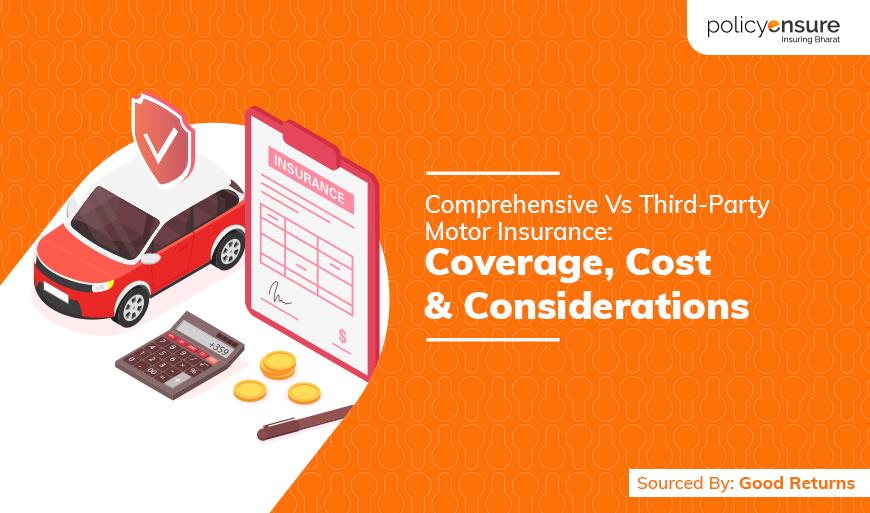Comprehensive Vs Third-Party Motor Insurance: Coverage, Cost & Considerations

When it comes to insuring your vehicle, it’s essential to choose the right type of motor insurance that suits your needs and offers adequate protection. In most countries, there are two primary options: comprehensive motor insurance and third-party motor insurance. Each type has its advantages and drawbacks, and understanding the differences between them is crucial for making an informed decision. This article aims to compare comprehensive and third-party motor insurance in terms of coverage, cost, and important considerations to help you choose the most suitable policy for your vehicle.
Coverage
Comprehensive Motor Insurance:
Comprehensive motor insurance, as the name suggests, offers extensive coverage for various scenarios. It not only includes third-party liability coverage but also covers damages to your own vehicle. In the event of an accident, theft, fire, or natural disasters like floods or storms, this type of insurance will reimburse you for repairs or replacement of your vehicle. Moreover, comprehensive insurance usually covers personal accident benefits for the driver and passengers, medical expenses, and legal liabilities arising from accidents.
Third-Party Motor Insurance:
Third-party motor insurance, on the other hand, provides coverage only for liabilities towards third parties involved in an accident caused by the insured driver. This includes compensation for injury or death of third parties and damage to their property. However, third-party insurance does not cover any damages to your own vehicle. It is the most basic form of auto insurance mandated by law in many countries.
Cost
Comprehensive Motor Insurance:
Comprehensive motor insurance typically comes with a higher premium compared to third-party insurance due to its wider coverage. The premium amount depends on various factors such as the vehicle’s make and model, the driver’s age and experience, previous claim history, and the location where the vehicle is primarily used or parked. While the upfront cost may be higher, the additional protection and peace of mind make it a preferred choice for many vehicle owners.
Third-Party Motor Insurance:
Third-party motor insurance is generally more affordable as it covers a limited scope of risks. While it provides the necessary legal coverage, it might not be sufficient for those seeking greater protection for their own vehicle.
Considerations
Vehicle Value and Age:
The value and age of your vehicle play a significant role in deciding the type of insurance you should opt for. If you own a brand-new, expensive car, comprehensive motor insurance would be a wise investment to safeguard your substantial financial outlay. On the other hand, if you own an older vehicle with a lower market value, third-party insurance might suffice.
Personal Financial Situation:
Your personal financial situation should also be considered when choosing insurance. If you can afford a higher premium and want comprehensive coverage, it could save you from significant financial burdens in case of accidents or damages. However, if you have budget constraints, third-party insurance might be the more viable option.
Driving Habits and Location:
Assess your driving habits and the environment in which you drive regularly. If you frequently commute in heavy traffic or live in an area with a high incidence of accidents or thefts, comprehensive insurance could be beneficial. Conversely, if you rarely use your vehicle or drive in low-risk areas, third-party coverage might be sufficient.
Additional Riders and Deductibles:
When choosing comprehensive insurance, consider the additional riders available, such as roadside assistance, zero depreciation, or engine protection. Additionally, check the deductible amount, which is the portion of the claim you’ll have to bear in case of an incident. A higher deductible can lower your premium but might increase your out-of-pocket expenses during a claim.
In conclusion, the choice between comprehensive and third-party motor insurance depends on your individual needs, budget, and risk appetite. Comprehensive vehicle insurance offers broader coverage, including damages to your own vehicle, while third-party insurance provides essential legal coverage for third-party liabilities. Carefully evaluate your vehicle, financial situation, driving habits, and location before making a decision. Ultimately, having any form of auto insurance is essential to protect yourself and others on the road, providing you with the peace of mind that comes with knowing you are financially secure in the event of an unforeseen accident.




